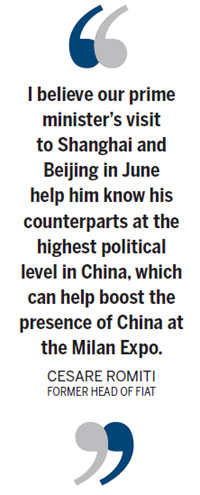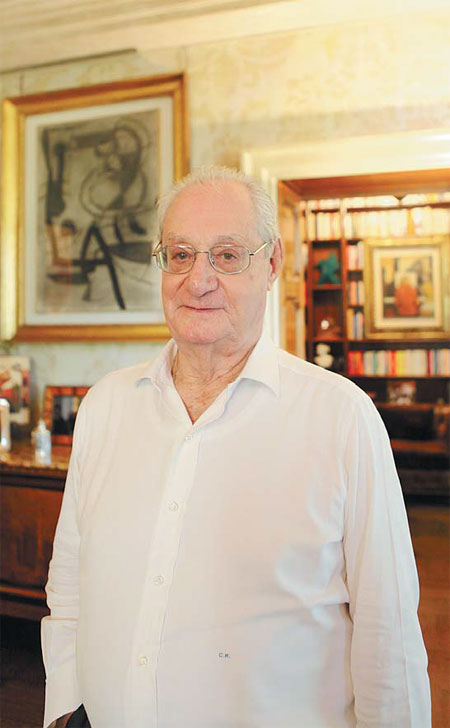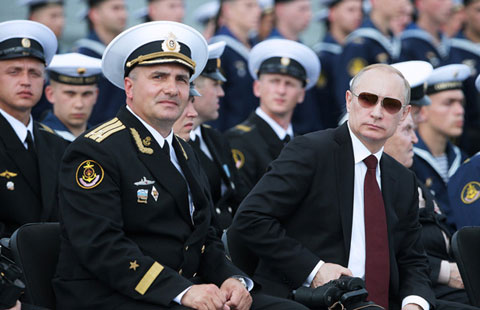Italy can learn from what Germany does in China, former Fiat boss says
Updated: 2014-08-01 10:01
By Fu Jing (China Daily Europe)
|
|||||||||||
|
Cesare Romiti says he has devoted "all of his time" to the Italy China Foundation. Fu Jing / China Daily |

Retired Italian business titan Cesare Romiti, 91, says one of the most memorable highlights of his career was helping to open a factory to produce Fiat vehicles in Nanjing in 1986.
These days, Romiti appears to be in good shape and works to promote links between China and Italy. Since about 2000, he says, he has devoted "all of his time" to the Italy China Foundation, a non-profit group that he founded and dedicated to strengthening business and cultural links between the two countries.
Romiti, an economist who worked for 20 years helping build the auto giant Fiat, led the company from 1996 to 1998 and was once known as "Il Duro", or the tough one, when he led the company.
And Romiti has some unequivocal opinions about how Italy's relationship with China could be elevated.
Italy should be following Germany's example in its relationship with China, Romiti says, adding that the Milan 2015 World Expo provides a valuable opportunity to improve ties with China.
Romiti spoke to China Daily in the guest room of his Milan home, surrounded by tasteful collections of books, paintings and other artwork. He appeared to still manage his time carefully, reminding a writer that he had to catch a train to Rome after the interview.
"Every week I make a round trip between Rome and Milan," he says.
His foundation's board of directors consists of high-ranking officials and managers representing the Italian government and local authorities, industrial confederations and leading enterprises and financial groups.
Romiti says he regrets that his country's auto industry, while competitive, has not gained as much traction in the enormous Chinese market as German companies.
"From Schroeder to Merkel, Germany's politicians have consistently devoted time and resources to deepen the relationship with China," he says, referring to former chancellor Gerhard Schroeder, who served from 1998-2005, and current Chancellor Angela Merkel.
In addition to Germany's competitiveness in the auto sector, Romiti says it is very clear that this political intervention is fundamental to Germany's success in China. "And this is what Italy should follow."
Some car brands in Italy, one of the world's leading manufacturing powerhouses, do have a respectable presence in China. He cited Fiat and Ferrari, which, respectively, serve ordinary families and the newly rich in China.
Romiti says he first visited China toward the end of 1970s as a tourist when China was just starting to open its door to foreign investors.
As China accelerated its opening-up process and started attracting more foreign investment, Romiti participated in a groundbreaking ceremony for the factory making Fiats in Nanjing. In 1985, the year before that, he helped arrange for China to send about 1,000 engineers and workers to spend a year in Italy learning more about vehicle manufacturing.
He says he learned a great deal and made many contacts in China, including with China's leaders.
"I have seen their lasting commitments in developing relationships with Italy," says Romiti.
Romiti recalls that President Xi Jinping, as vice-president of China at the time, visited Italy in 2011, giving Romiti a chance to exchange ideas with Xi when he gave a speech in Milan. "I saw his leadership charisma, and I also sensed that Xi is keen on forging a stronger relationship with Italy and Europe," Romiti says.
Romiti says the Italian leadership should do the same. He was glad to see young Italian Prime Minister Matteo Renzi, 39, paying three-day visit to Shanghai and Beijing in June, he says.
During Renzi's visit, Italy and China released a three-year action plan covering collaboration in areas of trade, industries and investment, finance, business, tourism and technological innovation.
Romiti says he got to know Renzi when the prime minister was mayor of Florence, and he hopes he will stay in office longer than his predecessors so China's leaders will be able to deal with a known quantity in Italy's leadership.
"I believe our prime minister's visit to Shanghai and Beijing in June help him know his counterparts at the highest political level in China, which can help boost the presence of China at the Milan Expo," Romiti says. "And in turn it will help boost China's investment in Milan and Italy."
Romiti says Italy has a historic opportunity this year and next with Milan hosting a major meeting of leaders from Asia and Europe as well as the World Expo. He says it is much like the opportunity China had in 2008 and 2010 when Beijing hosted the 2008 Summer Olympics and Shanghai hosted the 2010 World Expo.
Using the upcoming opportunities, Romiti says, China and Italy should focus on collaborating on healthcare, environmental and renewable energy, sustainable urbanization and agriculture and food security.
In these areas, Romiti says, Italy can offer know-how to China because it is still the fifth biggest manufacturing powerhouse in the world and the world's 11th economic power.
Asked for his advice for European investors who are exploring opportunities in China, Romiti offers three tips without hesitation.
"First, don't go alone," says Romiti, who explains that European investors should seek a strategic partner who knows the local business environment, though that doesn't necessarily mean that Europeans should set up a joint venture with local partners.
Secondly, Romiti says Europeans should "be humble" and should not think that China should be taught using European experiences.
"Most of all, your mindset should be that 'I need to learn and need to adjust myself to the local culture and environment'," says Romiti.
Europeans should also give up the idea that China is a low-cost manufacturing center, he says.
"Instead, it is an enormous market which consists not only of coastal and advanced regions but also the inland."
fujing@chinadaily.com.cn
(China Daily European Weekly 08/01/2014 page16)
Today's Top News
London hottest property for Chinese investors
Liberia shuts schools over Ebola
China's men no match for women?
Thai junta sets plan for fast rail links to China
Carnage at UN school as Israel pounds Gaza Strip
Abbas declares Gaza 'disaster area'
US House approves lawsuit against Obama
3 people killed, deputies wounded in NC shootout
Hot Topics
Lunar probe , China growth forecasts, Emission rules get tougher, China seen through 'colored lens', International board,
Editor's Picks

|

|

|

|

|

|






